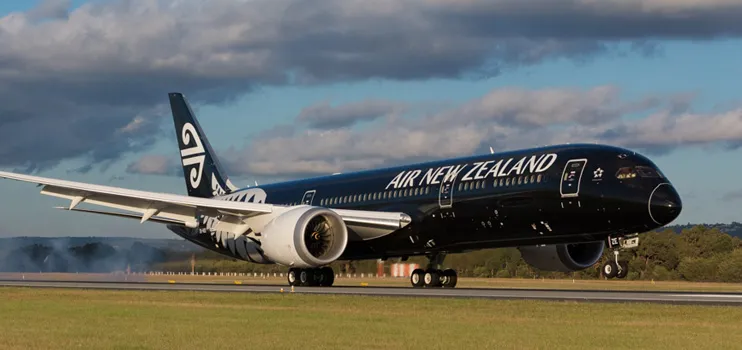
Paperwork snafu forces Air New Zealand China turn-back
Feb 11, 2019

Air New Zealand faced an unexpected setback when a paperwork issue led to the return of a flight bound for China. Shortly after takeoff, the crew discovered that the necessary documentation for entry into Chinese airspace was not in order. This oversight prompted a decision to turn back to Auckland, ensuring compliance with international regulations. Passengers were understandably frustrated by the situation, but safety and adherence to legal requirements remained the airline's top priority. The incident highlights the importance of thorough pre-flight checks and the complexities involved in international travel, particularly amid evolving regulatory landscapes.
In a recent incident that caught the attention of the aviation industry, Air New Zealand faced a significant setback when a paperwork snafu forced a flight bound for China to turn back shortly after takeoff. This unexpected turn of events has raised questions about the efficiency of airline operations and the importance of meticulous documentation. The situation has underscored the critical role that proper paperwork plays in ensuring smooth travel experiences for both airlines and passengers.
Understanding the Paperwork Snafu
The term "paperwork snafu" refers to an administrative error that can have substantial implications in the airline industry. In the case of Air New Zealand, the issue stemmed from incomplete or incorrect documentation necessary for the flight's entry into Chinese airspace. Such documentation typically includes visas, customs declarations, and compliance with international aviation regulations.
When the flight, which was set to transport passengers from Auckland to a major city in China, encountered this paperwork issue, the crew was left with no option but to return to Auckland. This decision, while regrettable, was made in the interest of adhering to international law and safety protocols.
The Impact on Passengers
The immediate effect of the turn-back on passengers was significant. Travelers were understandably frustrated, facing potential delays and the uncertainty of rebooking their flights. In the aftermath of the incident, Air New Zealand issued a formal apology to affected passengers and committed to addressing the underlying issues that led to the snafu.
To provide clarity on how such incidents can disrupt travel plans, we can look at the following table summarizing the potential impacts:
| Impact | Description |
|---|---|
| Flight Delays | Passengers experience delays, leading to missed connections and altered itineraries. |
| Financial Loss | Travelers may incur additional costs for rebooking, accommodations, and other expenses. |
| Customer Satisfaction | Incidents like this can lead to decreased customer satisfaction and trust in the airline. |
| Reputation | Frequent operational issues can harm the airline's reputation in a competitive market. |
The Importance of Documentation
This incident serves as a reminder of the crucial nature of proper documentation in aviation. Airlines must ensure that all necessary paperwork is in order before a flight takes off. This includes verifying that all crew members have the required certifications, that passenger documentation is correct, and that the flight complies with regulations set by both the departure and arrival countries.
In recent years, the aviation industry has seen advancements in technology aimed at improving documentation processes. Many airlines are now utilizing digital solutions to streamline paperwork, which can help reduce human error. However, as this incident shows, reliance on technology does not eliminate the need for thorough checks and balances.
Airline Responses and Future Precautions
In response to the incident, Air New Zealand has pledged to conduct a comprehensive review of its documentation processes. The airline aims to implement additional training for staff and enhance its operational protocols to prevent similar issues from occurring in the future. This commitment is essential not only for maintaining operational integrity but also for ensuring passenger safety and satisfaction.
Furthermore, airlines across the industry should take this opportunity to reassess their own procedures. Sharing best practices and lessons learned from this incident can foster a collaborative approach to improving the overall reliability of air travel.
Conclusion
The Air New Zealand paperwork snafu highlights the critical importance of documentation in the airline industry. While operational challenges can arise, it is the responsibility of airlines to ensure that all necessary paperwork is in order before departing. By prioritizing efficiency and accuracy in their documentation processes, airlines can enhance the travel experience for passengers and maintain their reputations in an increasingly competitive market.
As the aviation landscape continues to evolve, it is clear that the importance of proper paperwork and documentation cannot be overstated. Moving forward, both airlines and travelers alike must remain vigilant in addressing these issues to ensure safe and seamless air travel.
Related Articles

Explore Thailand: The Best Islands to Visit for Paradise, Adventure, and Relaxation

The Ultimate Guide to the Best Islands in Thailand for Your Next Getaway

Do babies need passports? How to get a passport for a newborn

How to get a U.S. passport fast: here’s how to expedite the process

What is Mobile Passport Control: 5 reasons why you should use it

SENTRI vs. Global Entry: A detailed guide

Do you need a passport to go to the Bahamas? Let’s find out

Do you need a passport to go to Mexico? A detailed guide

Do you need a passport to go to Canada? We got the answer

Do You Need a Passport for a Cruise: An Essential Travel Guide

Booster Seat Requirements: All the Rules to Follow in Your Rental Car

What Are the World’s Most Powerful Passports, and How Does Yours Rank?

How to Take a Passport Photo at Home: A Helpful Guide

You've got to have heart! Southwest's new livery

Your opinion: Should water be free on low cost carriers?

Young women bolder than guys as solo travellers
